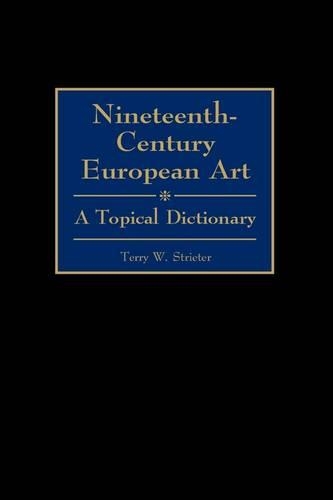
Nineteenth-Century European Art: A Topical Dictionary
(Hardback)
Publishing Details
Nineteenth-Century European Art: A Topical Dictionary
By (Author) Terry W. Strieter
Bloomsbury Publishing PLC
Greenwood Press
30th April 1999
United States
Classifications
Tertiary Education
Non Fiction
709.03403
Physical Properties
Hardback
312
Description
Major art movements and artists of nineteenth-century Europe, from the French Revolution to World War I, are presented alphabetically in a dictionary format. Artists and art movements are integrated within the politics and culture of the times. An examination of the prominent authors, politicians, rulers, writers, and musicians, who often posed for artists provides an historical background against which to study these famous, obscure, traditional, and avant-garde artists. Entries include the artists' models, many of whom became romantically involved with the artists, and the artworks in which the models appear. This focus on the European continent, rather than on one specific country, surveys the interconnected influences and politics that pervaded the lives of the artists during this age when Europe was powerful culturally and politically, and helps to explain the various art movements, such as the Neo-Classical, Romantic, Realist, Impressionist, Fauvist, Cubist, Expressionist, and Abstract, that consequently evolved. Art history scholars, artists, and anyone with an interest in European art and politics will appreciate the organization and detail of this comprehensive volume. The alphabetical entries, coupled with straightforward and accessible writing, make this reference both informative and engaging. As a research tool, entries are cross-referenced, and a bibliography provides a useful guide to further research.
Reviews
.,."very informative exposition..."-GaleGroup.com
"A highly readable text for college and university students....Each entry on a work of art contains its date and current location, a description of the work, and the context in which it was created....An approximately 125-entry bibliography and a detailed index conclude the volume....[T]his succinctly written, cleanly laid out dictionary gives concise information, clear definitions, and precise, useful references for in-depth research. Recommended for academic and large public library collections."-Booklist/Reference Books Bulletin
A highly readable text for college and university students....Each entry on a work of art contains its date and current location, a description of the work, and the context in which it was created....An approximately 125-entry bibliography and a detailed index conclude the volume....[T]his succinctly written, cleanly laid out dictionary gives concise information, clear definitions, and precise, useful references for in-depth research. Recommended for academic and large public library collections.-Booklist/Reference Books Bulletin
Any library will find this work of use in answering quick introductory questions relating to nineteenth-century art.-American Reference Books Annual
The book is extremely readable and provides easy access to dates and information that are often more cumbersome to find in more encyclopedic works. All libraries with art collections will find this book useful.-Choice
The Strieter work is recommended...to academic, museum, and art and design school libraries.-Art Documentation
...very informative exposition...-GaleGroup.com
...very informative exposition...GaleGroup.com
..."very informative exposition..."-GaleGroup.com
"Any library will find this work of use in answering quick introductory questions relating to nineteenth-century art."-American Reference Books Annual
"The book is extremely readable and provides easy access to dates and information that are often more cumbersome to find in more encyclopedic works. All libraries with art collections will find this book useful."-Choice
"The Strieter work is recommended...to academic, museum, and art and design school libraries."-Art Documentation
Author Bio
TERRY W. STRIETER is Professor of History at Murray State University and a specialist in modern French and European history./e He has published numerous articles on art history, the military, and politics.
